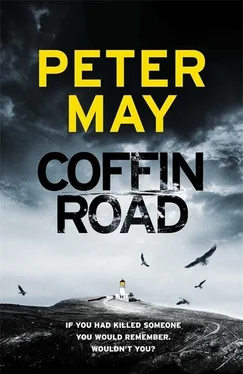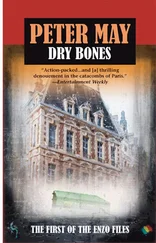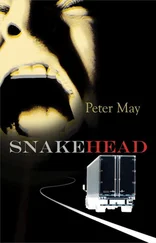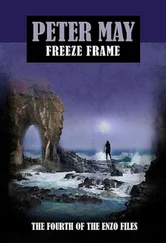Outside, the light was fading. September was evolving towards October. Summer to autumn. The shadow of winter already loomed large on the horizon.
Karen stood in the bathroom, staring at herself in the mirror. More than once, her godfather had told her that she was just like her dad. He hadn’t meant her appearance, of course.
She had always thought that, in looks, she took after her mother. Her dyed-black hair was naturally brown. A mousy, insipid sort of brown, somewhere between chestnut and blond, but without the distinction of either. Just like her mum’s. Although it was curly like her dad’s. For years, her mother had dyed her hair blond, though now, Karen thought, there was perhaps as much platinum white in it as any colour.
Her mother was a pretty woman. Not beautiful, but she had small, attractive features. Petite and perfectly formed. Cute. Somehow cute had bypassed Karen. Her features were not unlike her mother’s, but their arrangement was not as pleasing to the eye. She regarded herself as plain. Not the sort of girl that would turn heads.
But now, as she stared in the mirror, she was looking for any sign of her father. It pleased her to think that she had inherited his intelligence, and perhaps some of that belligerent personality that Chris Connor had spoken of. But she was desperate to detect some physical manifestation of it. Something of him that she could see every time she caught her reflection in a mirror, or a window. If she had inherited any of his physical attributes, it was in the blue of her eyes. Her mother’s were green. She had her mother’s mouth, but the lips were pale, like her father’s. And she gazed hard into her own eyes, as if perhaps her genetic inheritance might be staring back at her through the blue lenses of her dead father, critical, appraising.
For some reason, she still hadn’t opened the box, or her letter. And the longer she left it, the harder it became to do. She couldn’t really explain it to herself, but she felt sick every time she thought about opening either. She went back down the hall to her bedroom, pausing briefly on the landing at the top of the stairs. She could hear Derek and her mother talking in the lounge below, but the burble of the television masked their words and she couldn’t make out what it was they were saying.
She hadn’t been to school for days, and she knew that sooner or later they would contact her mother. But not yet, evidently. She slipped into her bedroom and shut the door carefully behind her. The Clarks shoebox and the white envelope sat on the bed, beckoning her to come sit beside them and open them up, to reveal the secrets she wasn’t at all sure she wanted to know.
She had not said a word to her mother, about going to the Geddes, or meeting her godfather on the beach at Portobello, and she wasn’t sure she had ever felt quite so alone in all of her short life. Even at the moment of learning about her father’s death, her mother had been there with warm, protective arms. But that umbilical had been cut now for ever. She was adrift on her own in a world vacillating between fear and uncertainty.
Tentatively she sat on the edge of the bed and lifted the shoebox on to her lap. The knot in the string was impossible to unpick and, in frustration, she reached for a pair of scissors on the dresser and slashed through it. The lid toppled to the floor. She peered into the box and, as she had feared, felt disappointment wash over her. There was really very little in it. Pens and pencils, a couple of erasers, a small stapler and a sprung implement with opposing claws for removing unwanted staples. There was a box of Gaviscon double-action antacid tablets, strawberry flavour, a fluorescent yellow marker pen, a small brown resin Buddha. She remembered something very similar to it sitting on his study desk here in the house, but bigger. And she wondered suddenly what had happened to all that stuff.
She lifted out two sheets of folded A4 paper and opened them up. The top sheet was the draft of a letter applying for a job at a university in England. She glanced at the date, and realised it could only have predated his redundancy by a matter of weeks. Or days. Had he seen the writing on the wall? If he’d got the job, would that have meant moving the whole family south? Or were he and her mother already bound for divorce? The second sheet was his résumé. All the jobs he had held over the years, and then a long list of his qualifications. She had not realised that he’d had so many degrees. An M.Sc. in Molecular Biology, a B.Sc. Honours in Genetics, a Ph.D. in Cell Biology. He had also studied ecology, and conducted investigations into chronic neurological conditions in both humans and insects.
She had known none of this about him. The years he must have studied, the jobs he had taken, research projects he had worked on. He left in the morning, he came back in the evening. He was the man she knew at nights and weekends, and on holidays. He was her dad. The other person he’d been had simply never existed for her. What kind of pain and pressure had he kept to himself? The loss of his job, the destruction of his research, a wife who’d been having an affair. Karen had been oblivious, and when it seemed to her that he hadn’t been there for her, she’d accused him of caring only about himself and screamed in his face, I hate you, I hate you, I hate you .
She did not even know she was crying until she saw her tears blister the paper she held in her hands. She laid it aside and quickly brushed away the tears with the back of her hand. At the bottom of the box was a picture frame lying face-down. On top of that, a grubby white business card. She lifted it out. It belonged to a Richard Deloit, Campaign Director of OneWorld. Karen had heard of the organisation. A highprofile, very vocal, international environmental group based in London. They were, it seemed to Karen, always in the news. Well known for gimmicks and stunts designed to attract media attention, if nothing else. She could even picture Deloit himself. A glamorous sort of man with curls of palladium white, full of righteous indignation and silky self-confidence, who seemed more impressed by himself than the causes he spoke for. She flipped the card over. There was a mobile phone number scrawled on the back of it, and the words, Call me .
She laid it aside and reached into the box again to retrieve the final item. As she turned it over, she saw that the frame was fashioned from hand-worked pewter and engraved with a Rennie Mackintosh design of interweaving tulips. She caught her breath when it revealed to her the picture it framed. She remembered it well. A photograph taken one year on holiday in France, when she was maybe five or six. She was wearing a pale blue print dress, and a wide-brimmed straw hat with blue ribbon over curling hair, much fairer than she remembered. It fell in soft loops to smooth, tanned, bare shoulders.
She gazed at that smiling, innocent face, and ached inside for those happy days of childhood spent, lost to the turbulence that would come in later years and wreck her young life. Her dad must have had it on his desk. And maybe he, too, had longed for those forgotten days and years when the sun seemed always to shine, and love and happiness just existed, like the sea and the sky.
She refused to let more tears fall, and reached over to place the photograph in its frame on her bedside table, determined to let it remind her that life had once been worth living. That, if she had been happy once, then maybe one day she would be again.
Now the box was empty, and she had no excuse for further procrastination. She lifted the letter and weighed it in her hands. But there was no weight in it at all. At least, not in the paper. The words inside, she knew, would be considerably more laden, and she couldn’t put off reading them any longer.
Читать дальше












